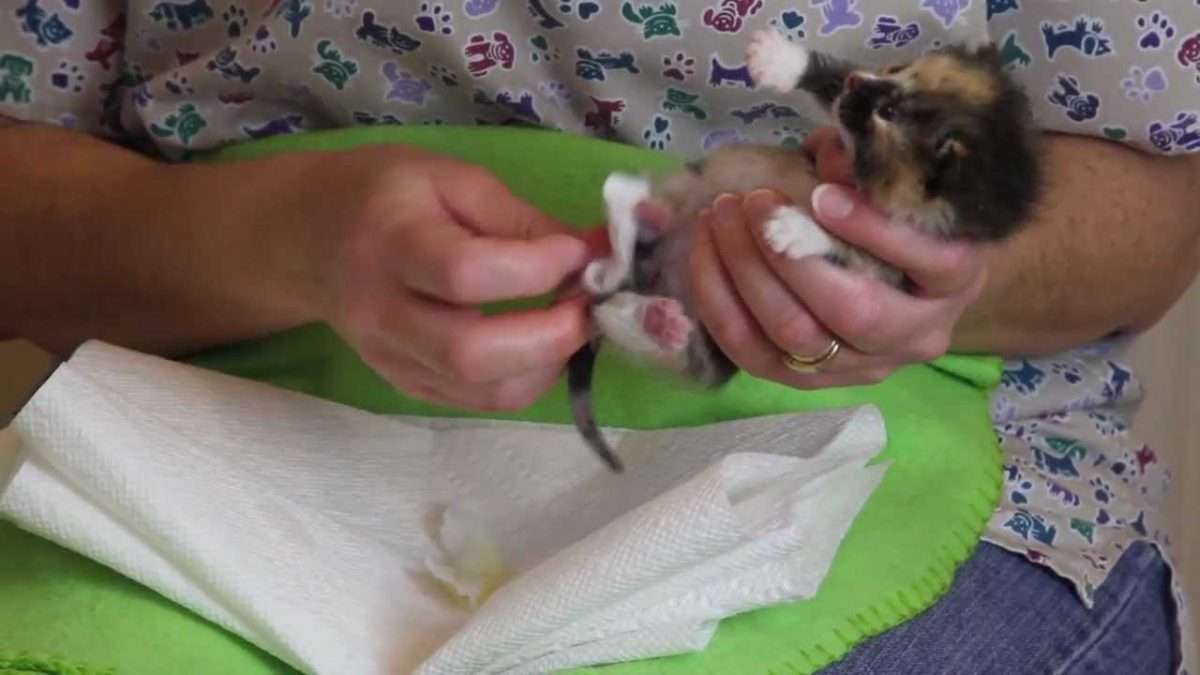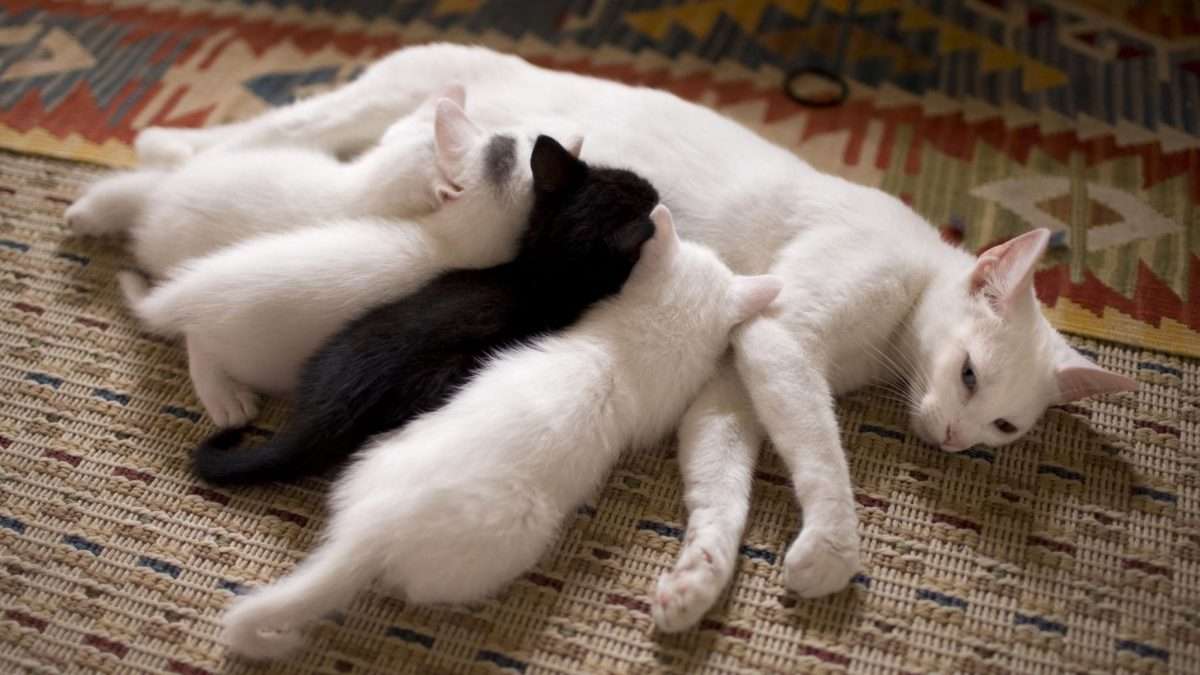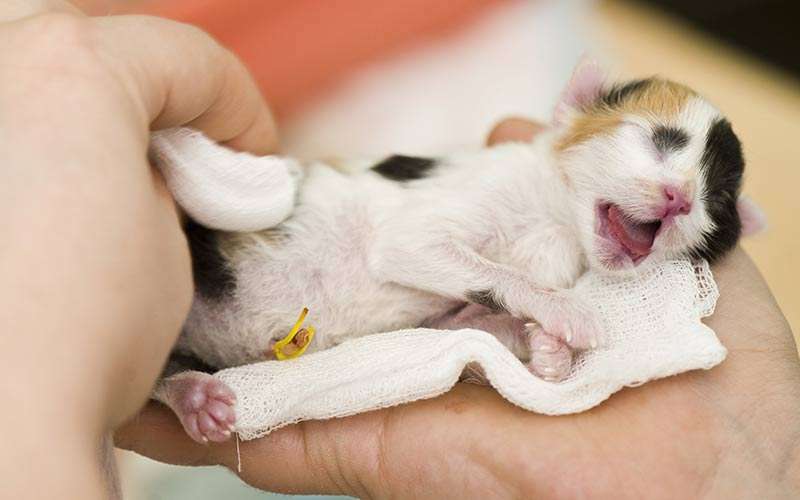How Do I Massage My Kitten To Poop
Usually, young kittens under the age of 3 weeks receive help from their mother to relieve themselves. Kittens at this age havent developed the awareness and ability to go on their own just yet, so they need some assistance.
Mother cats will encourage their kittens to poop by licking them. If you have orphaned kittens, youll have to mimic a mother cats actions to get the kittens to pee and poop.
You can help kittens poop after theyve finished eating. Start by using a damp washcloth or cotton ball. These items feel similar to a mother cats tongue.
Gently pick up the kitten with your non-dominant hand. Then, use the washcloth or cotton ball to massage the kittens anal area gently. You may have to massage for 10-40 seconds.
This motion should help the kitten to relieve itself. Keep massaging until the kitten stops peeing or pooping. Once the kitten has finished, make sure to clean and wipe it up. Do a thorough job of cleaning up your kittens anal area after each time it goes to the bathroom to avoid infections. Gentle and hypoallergenic cleaning wipes are safe items to use to keep your kittens clean and deodorize any smells.
The whole process of getting your kittens to relieve themselves shouldnt take more than a minute. If there are several consecutive instances where the kitten doesnt relieve itself within a minute, call your veterinarian to figure out whats causing the issue.
How Often Should Kittens Poop
Young kittens will usually go to the bathroom after every meal, but this will decrease the older they get. So, if youre feeding your cat several times a day, you can expect them to poop roughly the same number of times. As their digestive systems become better equipped with dealing with food and waste, they should only poop once or twice a day. Always keep an eye on your kittens bathroom habits you want to make sure their stool looks consistent and well-formed.
Symptoms Of Constipation Among Kittens
If you observed that the kittens are having difficulty in passing stool especially if its been around 48 to 72 hours already then you should contact your vet immediately.
Here are the common symptoms of constipation among kittens:
- kitten has dry, hard stool
- kitten is crying or straining in the litter box or avoiding it
- nausea
- peeing more but drinking less water
- walks stiffly
Recommended Reading: Can Humans Get Worms From Cats
Position The Kitten For Stimulation
Cat parents could stimulate the kittens in a variety of positions: some like to set the felines upright while others turn them on their back. You should pick the position that makes you as well as your furball feel comfortable. During the entire process, you have to hold your kitten firmly with one hand and stimulate it with the other. The ideal time for stimulation in most of the cases is shortly after feeding time. As a precaution, consider performing the stimulation in places that permit easy cleaning if things ever get out of hand.
When Exactly Kittens Start Pooping

So when do kittens start pooping? Newborn cats depend upon their mothers for just about everything, including help in elimination. In addition to nursing and bathing her kittens, a mother also uses grooming to stimulate her youngsters to defecate and urinate. Newborn cat cant eliminate on their own without mother cat help, and it usually takes 3 weeks until a kitten can defecate on its own. Typically the mother will nurse a kitten, then after the meal, groom them to stimulate pooping.
Mama cat stimulates pooping by licking the kittens rear-ends, and if you are fostering a newborn cat, you may need to take the role of mother and use a warm washcloth to wipe down the kittens bottom until he defecates and urinates. Its important to keep your little one clean and follow good hygiene habits.
When a cat reaches the age of 3-4 weeks old, he can start to poop on his own without stimulation from the mother. At this time, the kittens eyes are open, he is starting to explore his world, and he can start eating some soft food and kibble in addition to nursing.
Read Also: Can Cats Have Tuna In Oil
How Often Should A 4
Theres a slight difference between a 3-week and a 4-week old kitten.
The frequency is still 1-5 times a day for month-old kittens. The average is twice or thrice a day at this point.
As the kitten gets the gist of pooping on her own, it is a great time to litter train the kitten.
Set patterns as the owner and teach your cat to stick to those. Get the litter box ready and begin potty training the little one.
Also, pay attention to the poop color and consistency.
At this age, the kitten will begin eating solid foods. As such, her poop color and frequency of elimination will change as well.
Record everything in a book and track any changes over the next couple of weeks.
The records will also help you know if your kitten is healthy or not.
What To Feed Baby Kittens 6 Weeks Old
By six weeks old, kittens should be transitioned onto solid food. However, solid food doesnt necessarily mean hard food. Baby kittens will initially fair better on soft food, such as lightly soaked pellets. This commercial food should be formulated for kittens, as it will have a higher protein content than adult food, which is required for healthy growth.
Don’t Miss: Home Remedies For Cat Pulling Hair Out
How To Make A Constipated Kitten Poop
Constipation in kittens is a serious issue. Apart from being incredibly uncomfortable, it can indicate a serious issue within the cats body. This includes a blockage of sorts within the cats system, dehydration, heavy parasitic presence, and diseases.
You can help your kitten to poop by doing what a mother cat often does to her young kittens.
Grab a soft cloth or a cotton ball and dip in warm water.
Squeeze the water a bit then rub the kittens anus in gentle, circular motions.
Do this a few times until the kitty excretesfirst, she will urinate then she will poop.
If nothing happens after a few trials, discontinue and get the kitty to the vet.
If you keep going, you risk rupturing the kittens skin thus creating more problems.
Related Post: How to Stimulate a Kitten to Go to the Bathroom
How To Burp A Kitten
After each feeding you will need to burp the kitten to release any air they may have swallowed during nursing. If this air is not released it can cause gastrointestinal discomfort. There are 2 methods to choose from to burp the kitten.
- Hold the kitten upright with its tummy against your shoulder and pat it gently, but firmly on its back until it burps.
- Hold the kitten with its tummy against the palm of your hand and gently, yet firmly, pat its back until it burps.
If the kitten should bloat or become colicky add a few drops of infant anti colic drops such as Equate Infants Gas Relief from WalMart, to the formula.
A steady weight gain of about 10 grams, , per day is recommended, but do not be surprised if a kitten stays at the same weight for a day or two, then suddenly the weight gains are seen.
After feeding, burping, stimulating and weighing the kitten, check to see if the bedding in the nest box needs to be changed and that the temperature is correct. Then, put the kitten back in the nest box so that they can sleep. A properly fed kitten will sleep through to the next feeding.
You May Like: How Cold Can Cats Be Outside
S To Bathe An Underage Kitten
for a video from Maddie’s Institute on bathing orphaned kittens.
Can You Touch A Newborn Kitten
Although it’s hard to resist, you should avoid picking up newborn kittens during the first few days. Doing so can put their health at risk and can upset the mother cat, who may start displaying aggressive behaviour. But you should hold the kittens before they’re two weeks old. This helps the kittens get used to being around people.
Don’t Miss: Do Spayed Female Cats Spray
Don’t Reuse Dirtied Cloths
We all have our set of trouble to deal with every day but regardless of what happens, you must avoid stimulating your kitten using unclean cloths from the previous days. Bacteria develop at a fast rate which increases the risk of infection if you reuse dirtied cloths on the pet. Needless to say, if you care about the well being of your fluffy friend, it’s widely advised that you use fresh cloths for stimulation. Want to reuse old cloths? Then you have to thoroughly wash it to eliminate bacteria.
Normal Stools & Urine

Lets summarize and say: Poop should be brown and formed. Urine should be yellow. We have two handy guides for you below to help you decipher whats what, and to make sure your kitty is healthy, happy and hydrated.
1) A Guide to the Rainbow of Poop & Urine Colors
Color
Bloody Actual red blood seen in stool. Could indicate panleukepenia. Grossly abnormal, must be seen ASAP.
Mucous yellowish/white/clear slimy substance. Indicates severe bowel irritation. Grossly abnormal and needs immediate care.
Black True dark black color to stool. Usually indicates bleeding high in the bowel. Severe sign, needs immediate attention.
Brown Normal color. Be happy!
Orange Usually indicates way too much bile in stool, can occur with reflux. Seek medical advice.
Yellow Almost always indicates bacterial imbalance in the bowel. If has diarrhea also, usually related to coccidia. Seek medical advice.
White Grossly abnormal color, usually indicates, severe bacterial imbalance and severe infection in the bowel. Kitten at risk of dying, needs medical attention, ASAP.
Consistency
Dry/hard Abnormal, usually indicates dehydration. Seek care, promptly.
Firm Normal, be happy.
Formed but soft Low range of normal. If stools change from firm to soft you should seek medical advice.
Toothpaste Still has somewhat tubular form but falls apart once touched. Abnormal, needs medication.
2) Water Makes the World Go Round An Overview of Hydration
Skin Turgor
Urine Color
Also Check: Can Cat Uti Go Away On Its Own
How Can I Make My Kitten Poop
Young kittens require stimulation from their mother’s tongue in order to defecate. If orphaned, they need to be gently stimulated by a caregiver before every meal. Use a soft tissue or a baby wipe to stimulate the kitten’s anus in a circular motion, continuing movement until and while the kitten is pooping.
How Do I Clean Up My Kitten After A Poop Session
Part of keeping your young cat healthy and happy is to help keep him clean. And this means cleaning up his rear-end after a poop session. The good news is that you can help by doing the following:
- Start with a warm, wet washcloth, gauze, or cotton ball.
- Wipe gently using circular motions around the anus, genitals, and abdominal region where there is soiled fur and skin. Ensure that you wipe any debris away from the genital area so as not to spread poop particles in this area .
- After a wash, you can use a soft, dry towel to dry your kittens rear area. Try not to dry too roughly as this can cause skin irritation and a rash.
- Be sure to wash the towels and cloths you have used in a bleach solution to minimize the possibility of cross-contaminating other clothing in the wash.
Recommended Reading: How To Get A Voucher For Cat Neutering
Cat Poop In Senior Cats
Cat diarrhea can be one of many symptoms of hyperthyroidism, for example, along with ravenous appetite, weight loss, excessive thirst and urination and vomiting. Luckily for Jack, the diarrhea soon passed, but I watch for signs of it.
Dont worry: Most, if not all, cats will experience cat diarrhea or constipation during their lives. A bout that lasts a day or two, while not pleasant, is not uncommon.
Be concerned: If your senior cat has diarrhea or constipation for more than a day or so, take him to the vet as soon as possible. Cats become more fragile as they age Dr. Plotnick said. And senior cats can decline quickly if issues like diarrhea or constipation arent addressed quickly.
This piece was originally published in 2017.
It Could Be Due To The Wrong Kind Of Cat Food
Kittens should still be eating wet or moist canned food after theyve been weaned from their mamas milk. However, some pet parents may have given their pet kittens dry food or kibbles too soon and this could result in constipation. To prevent it from happening, gradually transition your kitten to dry food for her system to eventually adjust to the diet.
Recommended Reading: How To Make My Cat An Esa
How Long Can Newborn Kittens Go Without Eating
Newborn kittens should never go longer than two hours without a meal. When a bit older and transitioning to solids at around five weeks of age, you should still feed the kittens three or four times a day. This can be continued until six months of age. At 12 months old, most cats will only need two meals a day.
Lack Of Properly Balanced Diet
In their early days, kittens are fed by their mothers, but as they grow older and leave their litter to find new homes, they are often not given the diet they need to thrive.
Having a proper diet with the right amount of nutrients is important so the cat can grow properly. Ideally, cats should be feeding on wet food and gradually switch to canned food.
Giving them adult cat food can cause complications in their body and can even lead to constipation.
You should aim to feed your cat a proper proportion of food at least 2-3 times a day. Keeping a feeding bowl in different locations in your home helps the cat eat more often.
Also Check: How Long To Feed Kitten Chow
How Do I Feed A Newborn Kitten
Kittens under 4 weeks of age cannot eat solid food, whether itâs dry or canned. They can drink their motherâs milk to get the nutrients they need. The kitten will rely on you to survive if their mother isnât around.
You can feed your newborn kitten a nutritional substitute thatâs called kitten milk replacer. Itâs essential that you avoid feeding a kitten the same milk that humans consume. Typical cowâs milk can make cats very sick. If youâre unsure of which kitten milk replacer to choose, talk to a veterinarian. They can help you select the right one.
For many dry milk replacers, refrigeration is not always required. But if extra milk is prepared, it should be stored in the fridge. To feed your kitten, follow these steps:
Prepare the formula. Warm the kitten formula to slightly above room temperature. Test the temperature of the formula right before you feed your kitten. Do this by placing a few drops of the formula on your wrist to ensure itâs not too hot.
Keep things clean. Before and after each feeding, you should wash your hands and the bottle that you used to feed your kitten. Itâs also recommended that you use a âkitten gown.â This could be a robe or a shirt that you only wear when youâre handling or feeding your kitten. Using a kitten gown helps reduce the possibility of spreading germs.
If for any reason you canât get your kitten to eat, contact your veterinarian immediately.
When Do Kittens Start Pooping The Complete Guide To Your Kittens

When Do Kittens Start Pooping? The Way to Make A Kitten Poop? We show you the complete guide for the kittens first poop cycle.
Learn here:
Are you currently caring for a newborn kitten? If youre a new kitten parent, breeder, or any individual whos currently across the clear presence of kittens, studying the response towhen do kittens start pooping is, obviously, vitally essential. You need to cover a hoard of information apart from its pooping to be certain that it is growing healthy and happy.
In this blog post, we will talk about when do kittens start pooping and the specific reasons for this behavior of cats.
Contents
You May Like: Cat Skid Steer 299d Xhp
When To Worry About Constipation In Kittens
If your kitten hasnt pooped for 48 hours this should worry you enough to take it to a vet. If it has been in 24 hours, keep a close eye on its behavior and comfort.
If your kitten is in obvious pain, there is no harm in paying your vet a visit.
However, you shouldnt worry or automatically assume your kitten is constipated if it defecates fewer times one day than it did the day before.
The number of times a kitten poops can vary from one to six times a day and this can vary from kitten to kitten. Age is a relevant factor.